Enchanted
Posted on March 18, 2008 at 8:00 am
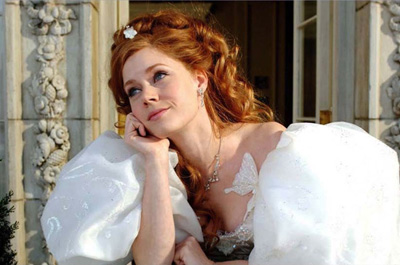
Fairy tales and modern-day Manhattan find a way to live happily ever after in this adorable Disney story about the adventures of a prince, an almost-princess, and an evil queen in New York City.
Posted on March 18, 2008 at 8:00 am

Fairy tales and modern-day Manhattan find a way to live happily ever after in this adorable Disney story about the adventures of a prince, an almost-princess, and an evil queen in New York City.
Posted on March 11, 2008 at 8:00 am
Those who are willing to open their hearts to this urban fairy tale will find its pleasures, as long as they they don’t think about it too hard.
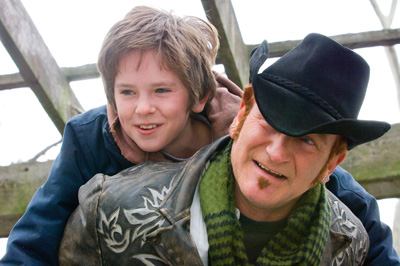
Posted on February 5, 2008 at 12:11 pm
On the list of movies featuring Beatles songs, this one comes far below A Hard Day’s Night, Yellow Submarine
, Let It Be
, and Help
but slightly above Sgt. Pepper’s Lonely Hearts Club Band
, maybe somewhere around Magical Mystery Tour
.
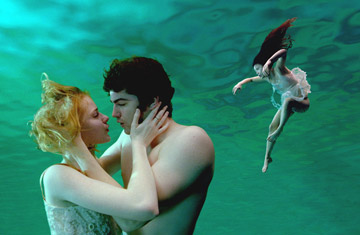
Director Julie Taymor is best known for Broadway version of “The Lion King,” which is itself best known for its visual splendor. And least known for its plot. There is visual splendor in this story of characters coping with the 60’s, to the tune of Beatles songs, but not much by way of plot. And the song covers by most of its stars are strictly with Beatles Night on “American Idol.” In one of those early episodes before much elimination.
For people who remember the 60’s, the movie’s look and sound will be poor competition for the kaleidoscopic visual and aural brilliance of the original Beatles creations and the story and characters will be superficial and simplistic compared to the kaleidoscopic upheavals of the era.
Those who know the Beatles’ work will find the movie’s references uninspired recreations rather than re-imaginings or responses. The character names say it all: Jude, Lucy, Max, Sadie, Rita, Prudence, JoJo, Dr. Robert, Mr. Kite, get it? Too on the nose. Max has a hammer. The singer and her band play on the roof until the police come to shut them down. People not familiar with the 60’s will wonder what the fuss was about.
There are some very clever touches in the staging of the musical numbers, as when at an induction physical, the Uncle Sam posters sing “I Want You” or in a couple of scenes where one song is played in sharply contrasting contexts. There are also some brilliant images, especially when the characters experiment with hallucinogens. But the story and characters are thin and so are the singing voices of most of the performers, with Eddie Izzard’s Mr. Kite, Bono’s Dr. Robert, and newcomer Dana Fuchs as a Janis Joplin-eque Sadie as welcome exceptions.
But they are supporting roles with too-brief appearances as the center stage goes to the featherweight story about a romance between blue collar Liverpudlian Jude (Jim Sturgess) and an American suburban princess named Lucy (Evan Rachel Wood) whose boyfriend was killed in Viet Nam. Lucy’s brother Max (Joe Anderson) and Jude move into one of those adorably Bohemian, summer of love, starving artist garrets in Greenwich Village, run by Sadie (Fuchs). They are soon joined by Jimi Hendrix-ish JoJo (Martin Luther) and unhappy-in-love Prudence (T.V. Carpio), who came in through the bathroom window, get it? Jude wants to be an artist; Lucy wants to protest the war. And everybody goes on a magical mystery tour and meets Dr. Robert and Mr. Kite.
It is overlong and under-written, visually vibrant but thematically transparent. The characters are more alive in the original Beatles songs than they are on the screen. And that leaves us nowhere, man.
Parents should know that the characters in this movie drink, smoke, and use drugs, including marijuana and hallucinogenics. They briefly use strong language and there are some emotional confrontations. The movie includes battle violence in Viet Nam, police brutality, and an offscreen explosion of a bomb built by protesters against the war. Characters are injured and there are sad offscreen deaths. Images include nudity, some stylized, and non-explicit sexual situations. A strength of the movie is the loyal and supportive relationships between characters of racial, gender, and sexual orientation diversity.
Families who see this movie should discuss some of their parents’ and grandparents’ experiences during the 1960’s. And they should listen to the original versions of the Beatles songs. Why are these songs so enduring and what groups today are producing songs that people will still want to hear in 40 years?
Families who enjoy this film will also enjoy A Hard Day’s Night, Yellow Submarine
, Let It Be
, and Help
, as well as other films about the 60’s like Alice’s Restaurant
and Hair
.
Posted on January 24, 2008 at 6:00 pm
B-| Lowest Recommended Age: | Middle School |
| MPAA Rating: | Rated PG-13 for some drug content, suggestive material and language. |
| Profanity: | Some strong language |
| Alcohol/ Drugs: | Drug overdose death (offscreen) |
| Violence/ Scariness: | Some peril |
| Diversity Issues: | Diverse characters |
| Date Released to Theaters: | January 25, 2008 |
Raya Green (Rutina Wesley) has to go back home because her Caribbean immigrant parents can no longer afford the tuition at her tony private school. They spent that money on drug rehab for Raya’s sister. But they were unable to save her; she died of an overdose. Raya comes back to her old neighborhood to face parents who are devastated and fearful and old friends who are resentful and suspicious. They feel that Raya thinks she is too good for them. Her first reaction is to try to play down her intelligence. When called to the board to solve a quadratic equation, she pretends it is very hard for her. But she does not fool her teacher, who assigns her to tutor the student who has been most hostile to her, Michelle (Tre Armstrong). When the two of them face off against each other, they don’t trade insults or punches — they show off their best dance moves. 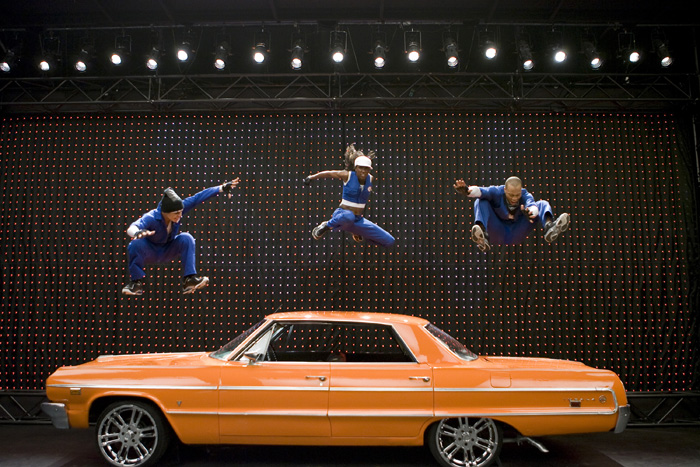
Posted on January 11, 2008 at 9:14 am
B-| Lowest Recommended Age: | Preschool |
| MPAA Rating: | G |
| Profanity: | None |
| Alcohol/ Drugs: | None |
| Violence/ Scariness: | Some mild peril and briefly scary monsters |
| Diversity Issues: | None |
| Date Released to Theaters: | January 11, 2008 |
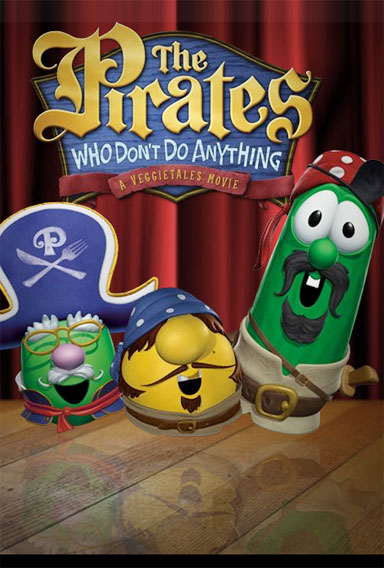 The Veggie Tales have produced a series of popular computer-animated videos for children and their families, with fruit and vegetable-inspired characters in engaging and funny stories with gentle moral overtones. Their new feature film does not mention God, as the videos do (briefly but explicitly). It is a fable-like story of three unlikely heros who find themselves called upon to rescue a captured prince and princess. They have been captured by their evil pirate uncle, who is planning to usurp the throne. We know he must be a bad guy because like all classic movie villains, he has a deep voice with an English accent. Unlike the other characters, he also has arms and legs, or rather one leg and one peg.
The Veggie Tales have produced a series of popular computer-animated videos for children and their families, with fruit and vegetable-inspired characters in engaging and funny stories with gentle moral overtones. Their new feature film does not mention God, as the videos do (briefly but explicitly). It is a fable-like story of three unlikely heros who find themselves called upon to rescue a captured prince and princess. They have been captured by their evil pirate uncle, who is planning to usurp the throne. We know he must be a bad guy because like all classic movie villains, he has a deep voice with an English accent. Unlike the other characters, he also has arms and legs, or rather one leg and one peg.
Princess Eloise, in a Princess Leia-like desperate call for help, throws a golden ball into the ocean and tells it to find her some heroes. But the people, or rather, vegetables it finds do not seem very heroic and certainly do not think of themselves that way. They are “cabin boys” (waiters) in a pirate-themed dinner theater called “Pieces of Ate” who can’t even manage to get up the nerve to try out for the show. Elliot is afraid of so many things that he keeps a fight list. Sedgewick is lazy and thinks trying is too much work. And George, who has the husky cadences of a Borscht Belt comic, does not respect himself and realizes that his children do not respect him, either.
But the golden ball finds them and soon they find themselves on a rowboat in the ocean, on their way to rescue Princess Eloise and her brother Prince Alexander. Each of our trio will face important challenges and learn important lessons. And of course there will be a little adventure and a lot of silliness and a couple of musical numbers along the way.
The Veggie Tales’ colorful but limited animation can seem static on the big screen, and children used adventures that conclude in a brisk half hour may find this feature film a little long. But the gentle humor and equally gentle lessons will be appealing to younger children and long-time fans.